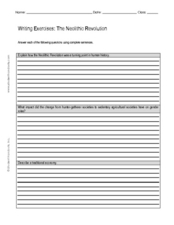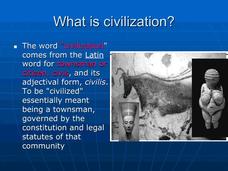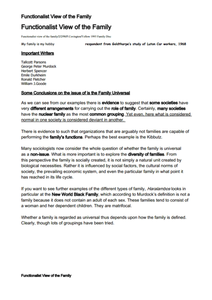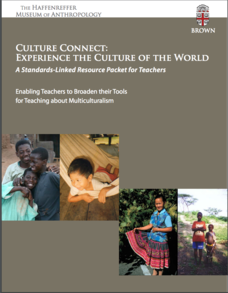American Museum of Natural History
Silk Road Fables
Talk about rabbit holes! With just this one resource, learners can travel the Silk Road listening to fables, meet a scientist who studies poisons (and whose favorite book is Alice in Wonderland), and listen to a video interview of an...
Curated OER
Writing Exercise: The Neolithic Revolution
Provide a format for your historians to explore the Neolithic Revolution using this writing exercise. Three display questions prompt scholars to reflect on how the revolution was a turning point in human history, its impact on gender...
Curated OER
Civilization
A good start to a larger discussion, this presentation address the qualities and characteristics of a civilization. It briefly discusses the earliest civilizations, leaving your lecture as the next logical step in a world history or...
Curated OER
Lost Treasures of Tibet: Mandalas
Students examine the history of mandalas from Tibet. After reviewing the Designing a Mandala handout, they use geometric symmetrical shapes to create their own examples. Next, they write poems or essays and explain the meaning of the...
California Academy of Science
Human Evolution
As the great and hilarious Tim Minchin once said, "Science is simply the word we use to describe a method of organizing our curiosity." Science is more than just a guess; it is based on questions, observations, and evidence. High...
Curated OER
Breathing New Life into Old Traditions
Students investigate the role of ceremonies and other traditions of Native American cultures. They research various Native American nations and create posters that visually depict their research.
Curated OER
"Their Eyes Were Watching God": Folk Speech and Figurative Language
Using or considering using Zora Neale Hurston's Their Eyes Were Watching God? Then this packet is a must for your curriculum library. The examination of how Hurston combines folklore and folk language to create the voice of her...
Curated OER
Caves
Explore caves with your class! Your scholars will participate in scientific observation, research, inference and deduction, reading, vocabulary, and writing activities about caves with this lesson plan. This resource contains five...
American Museum of Natural History
Make Your Own Mythic Mask or Puppet
No need to wait until Halloween to create a mask. Young anthropologists get involved in the centuries-old tradition of mask and puppet making with the help of an engaging resource that shows them how to craft their own masks or puppets.
Curated OER
Teaching About Genocide
Teaching children of any age about genocide or The Holocaust can be difficult, as the content is sensitive and often emotional. This academic article was written by an educator and is intended to help you consider multiple aspects of...
Curated OER
Human Evolution: Biology, Bones
Learners will love a weeks worth of bone study. They use bones and characteristics of bones to explore the evolution of hominoids. Bones are compared, categorized, and considered. A great way to bring physical anthropology and material...
Indian Land Tenure Foundation
Native Foods and Livelihoods
Introduce young scholars to the ways in which land and people have a relationship. They examine the types of food local tribes have traditionally consumed and ways in which the people and the land both benefited from the act of...
Curated OER
Comparing Cultures
Students examine the nature of culture, and compare/contrast various cultures and their artifacts and ceremonies. They develop a class list of artifacts, complete a worksheet, and create a poster or diorama describing an object that is...
Curated OER
The Short Answer
Young scholars examine the discovery of the Flores man. In this anthropology lesson plan, students discover details about the Flores man and the work of anthropologists. Young scholars are challenged to create their own stories that...
Curated OER
Ancient Cultures
Students develop archeological skills in order to explain how scientists determine what ancient cultures were like. They develop an appreciation of the work that is involved in finding out about our past.
Curated OER
"ART ZOO 'Blacks in the Westward Movement', 'What Can You Do with a Portrait', and 'Of Beetles, Worms, and Leaves of Grass'"
Students study black history, examine portraits and portrait making and create their own portraits, and investigate their natural environment. This humanities lesson provides a text that can be used to teach lessons in black...
Sociology Central
Functionalist View of the Family
Any social science class studying functionalism and family may benefit from these eight pages of background information and activities. It does not include specific learning objectives, assessments, or rubrics, but it is a great source...
Curated OER
Social Studies Wonders: An Exploration
Help middle schoolers conduct Internet research and develop a working definition for the discipline of social studies. From a list of websites, they develop classification skills and differentiate between primary and secondary sources....
American Museum of Natural History
Dress Up a Horse
Walk, trot, gallop! Young equestrians have an opportunity to learn all about horses with an engaging resource that lets them select tack to dress up a horse, create flip books that illustrate the various gates, have questions answered by...
Brown University
Culture Connect: Experience the Culture of the World
A rich series of activities introduces learners to the concept of culture by closely examining the behaviors, practices, and art of three distinct peoples: the Highland Maya of Guatemala, the Hmong of China and Southeast...
Curated OER
Urban Ecosystems 4: Metabolism of Urban Ecosystems
Cities are compared to living, breathing, metabolizing organisms. Fourth in a five-part series of lessons, this one focuses on the flow of materials through a city. Links to interesting websites and images make your delivery of...
Curated OER
Life Along the Ring of Fire
Students research geological forces that create the Ring of Fire and its effects on cultures. They write reports on how natural disasters influence societies.
Curated OER
Indians in Georgia: How Do We Know What We Know?
Students discover archaeology by investigating the history of Native Americans in Georgia. In this U.S. history instructional activity, students participate in a mock archaeological excavation in their classroom by recovering...
Curated OER
Native Lands: Indians in Georgia, How Do We Know What We Know?
Students examine Native American oral traditions. In this Georgia history lesson, students discuss Native American oral traditions and research stories of migration. Students create their own oral history projects that feature their...

























